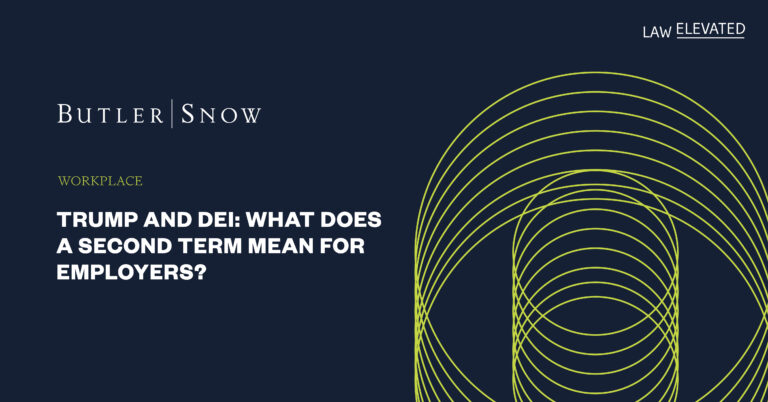In the flurry of executive orders issued shortly after being sworn for a second term, President Donald Trump issued two executive orders and one presidential action dismantling all diversity, equity, and inclusion (DEI) programs, policies, mandates, preferences and activities in the federal government and discouraging private sector employers from maintaining their DEI practices. As a result, private sector employers are left wondering about the future of their DEI programs and what actions they need to be taking, if any, to ensure compliance with applicable federal and state laws.
The two executive orders titled, “Ending Radical and Wasteful Government DEI Programs and Preferencing,”[1] and “Reforming the Federal Hiring Process and Restoring Merit to Government Service,”[2] call for the termination of all DEI and “diversity, equity, inclusion and accessibility (DEIA) mandates, policies, programs, preferences, and activities in the Federal Government, under whatever name they appear,” and require that “[f]ederal hiring should not be based on impermissible factors, such as one’s commitment to illegal racial discrimination under the guise of ‘equity,’ or one’s commitment to the invented concept of ‘gender identity’ over sex.” As a result of the executive orders, on Wednesday, January 22, 2025, all federal employees in DEIA offices were placed on a paid administrative leave, all outward facing websites and social media pages of DEIA offices were required to be taken down, and agency leaders were ordered to cancel any DEIA-related training and terminate any DEIA-related contractors.
While neither of the above-mentioned executive orders mention private sector employers, on Tuesday, January 21, Trump announced a presidential action titled, “Ending Illegal Discrimination and Restoring Merit-Based Opportunity,”[3] which includes a section labeled, “Encouraging the Private Sector to End Illegal DEI Discrimination and Preferences.” The Action calls on the heads of all agencies with the assistance of the Attorney General, to create a report containing recommendations for enforcing federal civil rights laws in the private sector “and taking other appropriate measures to encourage the private sector to end illegal discrimination and preferences, including DEI.” The report shall identify “the most egregious and discriminatory DEI Practitioners in each sector of concern” and each agency “shall identify up to nine potential civil compliance investigations of publicly traded corporations, large non-profit corporations or associations, foundations with assets of 500 million dollars or more, State and local bar and medical associations, and institutions of higher educations with endowments over 1 billion dollars.”
Trump’s disapproval of DEI efforts and the recent discussion on the legality of DEI is neither surprising nor unfamiliar given the United States Supreme Court’s 2023 decision, Students for Fair Admissions, Inc. v. President and Fellows of Harvard College, (“SFFA”) in which the Court, comprised of several appointees from Trump’s first administration, found that the college admissions processes used by both Harvard and UNC, where an applicant’s race could become a factor weighing in favor of admission, was unconstitutional. The question quickly became whether SFFA would have a larger application outside the college admissions process which is governed by Title VI of the Civil Rights Act of 1964. Many politicians took the opportunity to argue that it did, which included efforts by politicians to threaten Fortune 100 CEOs and law firm managing partners that their DEI programs may be violating federal law. Moreover, many conservative groups took the decision as an opportunity to file lawsuits against large private sector businesses regarding the DEI practices. Notwithstanding, as addressed then, SFFA did not apply to private sector businesses, only to college admission processes governed by Title VI of the Civil Rights Act of 1964, which prohibits discrimination on the basis of race, color, or national origin by any program or activity that receives federal financial assistance.
Now, almost two years after SFFA, private sector employers are again faced with the question of what they should do concerning their current DEI practices considering the Trump administration’s blatant disapproval of DEI measures. Trump’s executive orders and presidential action do not change the enforceability of the federal laws prohibiting discrimination and harassment in the workplace, based on any protected category. That being said, now is the time for private sector employers to review their current DEI practices and policies to ensure they comply with existing and applicable federal and state law. The executive orders and presidential action do not specify which DEI/DEIA practices are considered “illegal” with the exception of “illegal discrimination” and/or “preferences.” Illegal discrimination (i.e., treating an employee or applicant differently based on a protected category) and preferences, (i.e., an employer selecting an individual for an employment action based on a protected category), have and remain illegal under the federal statutes prohibiting discrimination. And, as mentioned in Butler Snow’s Workplace Blog covering SFFA, any decision in an employment setting, in which a protected category—including but not limited to race, sex, age, religion, or disability—is used to make an employment decision (including but not limited to hiring, firing, and advancement) is and remains illegal discrimination under the federal statutes. Neither SFFA nor the second Trump administration’s recent attacks on DEI change this fundamental principle of law.
If you have any questions about your company’s employment practices, please contact a Butler Snow Labor and Employment attorney.
[1] https://www.whitehouse.gov/presidential-actions/2025/01/ending-radical-and-wasteful-government-dei-programs-and-preferencing/
[2] https://www.whitehouse.gov/presidential-actions/2025/01/reforming-the-federal-hiring-process-and-restoring-merit-to-government-service/
[3] https://www.whitehouse.gov/presidential-actions/2025/01/ending-illegal-discrimination-and-restoring-merit-based-opportunity/
